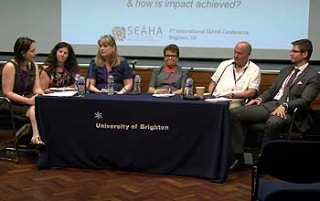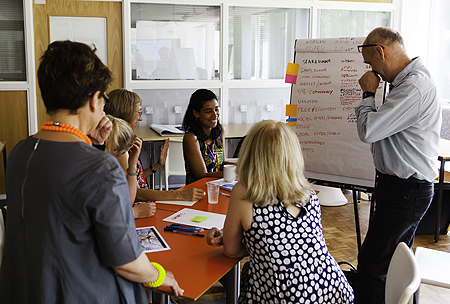Research is a communicative process. Its value is enhanced through knowledge exchange and incorporation into practice. Though impact has always been the primary motivation for research, designing research that generates impact beyond academia is not straightforward. It takes time, commitment, and a supportive working environment.
To explore the issue of heritage science impact and how this can be strengthened, ICCROM coordinated a workshop on 20 June at the 3rd International Conference for Science and Engineering in Arts, Heritage and Archaeology (SEAHA), held on 19-20 June 2017 at the University of Brighton, United Kingdom.
The workshop focused on current aspirations for inclusive research design and how to put them into practice. It was structured in two parts: a panel discussion that brought together key research stakeholders from within and beyond the heritage science sector, and a group work exercise. A central point of reference was the generation of non-academic impact.
The sessions focused on what makes research impactful and how that is achieved. It also explored issues of diversity and the building of strong collaborative partnerships beyond academia for heritage research and preservation.
Panel discussion: “What makes research impactful and how is impact achieved”
The panel was composed of key actors from diverse disciplines and contexts representing higher education, post-graduate student communities, heritage agencies and mainstream broadcast media. Panelists shared their perspectives on the current role of research, their vision for heritage science, and pragmatic goals for more relevant and impactful knowledge production and sharing in the future.
The discussion highlighted the role of heritage science in nurturing active citizenship not only through the enjoyment of heritage but also through participation in its making, investigation and preservation. Emphasis fell likewise on the need for heritage science to set research priorities beyond sector-specific agendas, and align itself to address current societal challenges. Key aspects such as understanding different audiences, their needs and motivations were discussed, with the recognition that connecting outwards requires a proactive approach.
In its recommendations, the panel called for greater attention to be paid to stakeholder engagement by research groups, and for non-academic impact practices to be embedded within the early stages of research planning.
The panel was comprised of:
- Alison Heritage, Heritage Science Officer, ICCROM (moderator)
- May Cassar, Director of Institute for Sustainable Heritage, University College London and Director of Science and Engineering in Arts, Heritage and Archaeology Centre for Doctoral Training
- Katy Lithgow, Head Conservator, National Trust, UK
- Tom Feilden, Science Editor, Today Programme, BBC Radio 4
- Joanna Allen, Research Impact Manager, Research Enterprise & Social Partnerships Department, University of Brighton
- Dzhordzhio Naldzhiev, SEAHA Doctoral Student, University College London
Group-work exercise: “Diversity and impact: who to engage and how?”
Faced with a challenging case study of a public guerrilla art installation, participants worked in teams to devise a plan for its investigation and explore options for future preservation. The session aimed at highlighting issues of diversity — human and/or material-centred — and how these aspects can facilitate or hinder the research process. The exercise reinforced key messages that arose from the panel discussion with regard to the power of dialogue and the value of early involvement of stakeholder groups in research planning. The activity was adapted from a session developed for the ICCROM international summer school on Communication and Teaching Skills in Conservation and Science.


